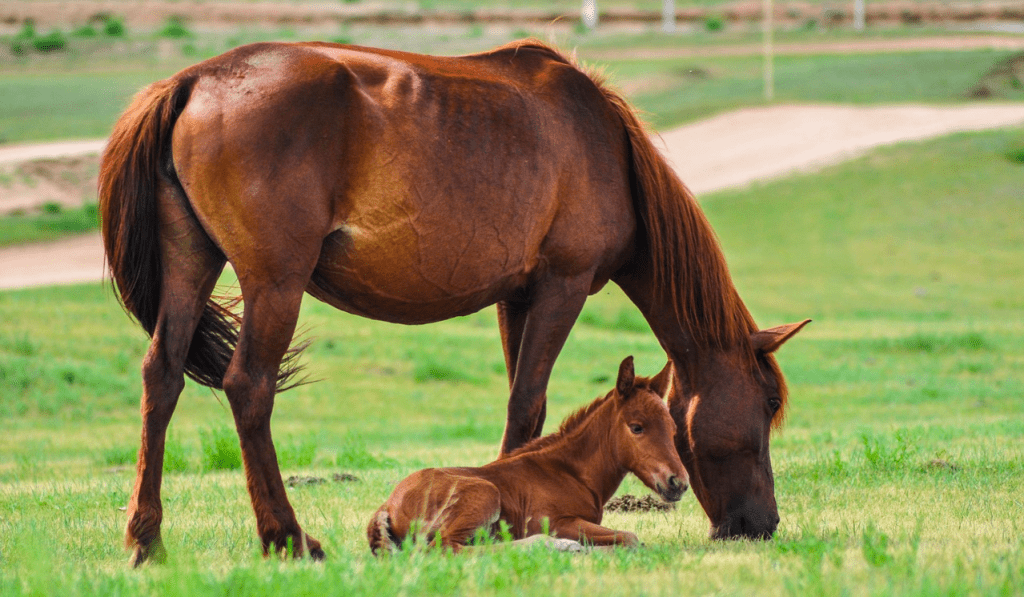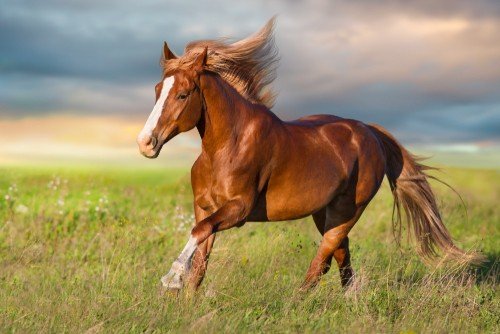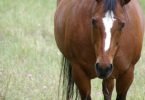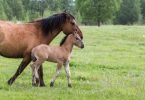Each animal has its personality. Not all animals are the same, and they all behave differently. Like their owners, we must find out whenever something is going wrong with them. Most importantly, giving them proper care and nourishment are our topmost priority. Horses are active, lively creatures that have been with humans for a long time. They are fun to be with, but there are things we might not fully understand about them. Here are the behavior problems in horses you could encounter in the long run.
Boredom
A wide array of behavior issues in horses stem from boredom. Thus, making sure our horses are well-entertained and active should be a top priority. Too much time confined in their stables will bore your horse. Eventually, they will exhibit quite unpleasant and sometimes destructive mannerisms.
We don’t need to provide them with toys or special tools. Simply making sure they are getting enough field time is sufficient. It will allow them to interact with other horses and animals and spend their energy walking and grazing in the fields. Furthermore, horses become restless when they’re always in their stables. They need physical activity to stay healthy, both physically and mentally.
Signs that your horses are bored include stable vices, aggression, and restlessness. Always remember to check on your horses from time to time. The earlier you spot this problem, the sooner you can solve it, the better.
Stall walking or circling
Have you ever noticed your horse walking in circles around his stall? This behavior is often referred to as compulsive circling. If you think that your horse is doing this constantly for no reason, it might be good to bring him to the vet.
It could be due to a neurologic or brain disease that affects your horse’s activity. The brain is responsible for the motor, coordination, and balance of horses. Thus, problems in the brain could manifest as abnormal patterns in walking or other behaviors. Moreover, vision problems can cause this issue, as well as other behavior problems in horses. Visual problems are not easy to see in horses. It could be due to trauma, cancer, infection, and other problems.
Weaving
Weaving is an activity of horses wherein they repeatedly sway and move their heads and neck from side to side. Along with this, they also switch their weight to their front legs. This is an example of a stable vice – a stereotypical movement done by horses due to confinement in stables.
This behavior is usually a result of boredom from prolonged confinement in stables. Furthermore, lack of physical activity and other exercises could also promote this behavior. Horses become restless, and weaving becomes their way of releasing their energy. Thus, the solution to this behavior problem is an increase in physical activity. Read this post on Different Ways to Stop a Horse from Weaving.
Pawing
Digging or pawing is one of the common horse behavior issues. This behavior involves digging the ground or floor with their front feet. Generally, this is normal behavior among horses. However, it becomes a behavior problem when they do it consistently. Often, pawing is accompanied by other symptoms. It includes lethargy, seeking attention, and sometimes aggression. Read this post on Different Ways to Stop a Horse from Pawing.
There are several reasons why your horse is pawing. Among these are hunger, boredom, irritation, isolation, and lack of physical activity. Proper stable management is key to solving most horse behavior issues. Make sure your horse is getting enough free time from the stables. Furthermore, variety in their daily routines is helpful to alleviate their boredom. Daily exercise is essential in preventing pawing among horses.
Kicking
Incessant kicking is among the many dangerous behavior problems in horses. It’s something you shouldn’t take lightly. However, your horse won’t randomly kick for no reason. Thus, you must figure out the reason for this behavior.
Whenever your horse feels threatened, one of its instincts is to use its best weapon, its legs. If they sense danger, they will leash out by kicking what is visible in front of them. Sometimes, kicking may stem from anxiety, as well. Follow These Steps To Stop Horse Kicking Behavior.
If your horse manifests this behavior, stay alert and on guard at all times. Never startle your horse when you’re approaching. Most of the time, a firm hand is what it takes to curb many behavior problems in horses. Let him know that you are in charge.
Cribbing
Cribbing or crib-biting is another stereotypical behavior that involves horses using their front teeth to latch on a hard object. These objects are usually stable doors or anything within their reach. This behavior results in the horses inhaling more air than usual.
This behavior in itself is not a manifestation of a serious disease. However, it’s a sign that your horse is bored, stressed, or anxious. When your horse’s daily routine becomes repetitive and monotonous, they exhibit horse behavior issues. Although it may look benign, cribbing causes serious health problems like dental issues, bloatedness, stomach ulcers, and many others. Make sure your horse is getting enough daily stimulation to avoid this behavior problem in horses.
Self-mutilation
Equine self-mutilation is one of the most bizarre behavior issues in horses. This behavior involves horse biting, kicking, stomping, which results in injury to themselves. Moreover, they may also throw themselves into objects or walls, which causes injury.
This particular behavior is most likely due to intense physical discomfort or pain. When you don’t address this soon, horses tend to hurt themselves instead. Thus, if you see this behavior in your horse, bring them to the vet immediately to determine what’s causing the pain. Usually, when the discomfort is eliminated, the horse behavior problems go away, too.
Geldings that act like stallions
Sometimes, a castrated horse will act like a stallion macho. It might be confusing to horse owners initially, but it’s completely normal. A male horse’s brain works quite differently from a female’s. Although their testicles were already removed, they may exhibit dominance and other related behaviors because the testosterone’s effects remain.

There are a few instances wherein your horse wasn’t completely gelded. A condition in young horses called cryptorchidism is common. It is when one of the testicles didn’t descend to the scrotum. Thus, a testicle could still be in your horse supplying the testosterone. However, this is very rare.
Estrus
Estrus is a cycle referring to the reproductive cycle of horses. Hormones play a part in horses’ reproductive cycles. Depending on the hormone levels, your horses might exhibit physiologic changes. Estrus is the time when your horse is ‘in heat.’
You can easily point out when your horse is in heat. It will appear as winking or clitoris eversion, tail elevation, squatting during urination, and many other signs. These are not behavioral problems in horses. These are all signs that your horse wants to mate and is ready for reproduction.
Nymphomania
There are times when a horse’s heat goes out of control. Take note that your horse’s sexual activity and behavior are greatly affected by hormones. Thus, your horse could be suffering from some hormone imbalances or reproductive abnormalities.
Nymphomania or extended period of estrus is a common behavior problem in horses with problems in their reproductive organs. It could be tumors in the ovary or uterus. If you notice this in your horse, coordinate with your vet.
Silent Heat
Silent Heat is one of the many estrus-related behavior problems in horses. It is when a horse refuses to be bred or fails to undergo a reproductive cycle. It usually occurs after a horse gave birth. Pregnancy and delivery greatly alter the horse’s hormones responsible for sexual activities. Meanwhile, other reproductive anatomic problems can cause this issue as well. The horse’s ovaries send feedback to the brain to release sex hormones. When there’s something wrong with the ovaries, the hormone levels throughout the body are affected.
Your vet will perform some tests to determine the cause of silent heat. It includes ultrasound, blood tests, as well as manual palpation of the rectum. If the problem is untreatable, you may opt for Artificial Insemination (AI).
Fear and Phobia
Fear is often a defensive strategy of the brain in most horses. However, they cause some of the most common behavior problems in horses. There are many types of phobia horses typically experience. Some of them will be discussed in this article.
Remember to show compassion for horses who exhibit fear. Never treat them with violence. It won’t help either party. Often, this just makes the horse more aggressive and dangerous.
Desensitization is something you can do for most behavioral problems in horses. Exposing your horse to their fears in small quantities and extended over a while might help them deal with their phobia. However, you should only do this if your horse is not showing any aggressive behavior. Otherwise, you’re better off asking a professional trainer’s help.
Certain medications are also helpful for horses who suffer from traumatic experiences. These medications will also aid you as you train your horse.
Claustrophobia
Claustrophobia or fear of enclosed spaces is not an uncommon behavior problem in horses. It is a common example of phobia among horses. After all, these horses were always running around open fields for many years. Thus, they are not used to being in enclosed spaces like a stable all the time.
Giving your horses calming agents is one thing you can do for a claustrophobic horse. There are many natural calming supplements you can get without a prescription. It will help your horse adjust to space if he is feeling anxious or scared in his space.
Bucking, rearing, bolting, spinning and shying
Most negative behavioral problems in horses result from fear or stress. It can be in the form of spinning, bucking, bolting, or rearing. Unfortunately for us, when a horse is scared, they become dangerous. It makes helping them out even more difficult.
If you notice your horse bolting or galloping out of control, it’s a sign that he wants to ‘escape.’ Although this behavior comes from instincts, it’s also a sign of phobia or fear from past events. It might be due to a past traumatic experience.
On the other hand, bolting or bucking can be a sign of poor training. Sometimes, your horse gets overwhelmed or confused during training and reacts violently. Make sure to take time when training your house.
Foal Rejection
Has your horse recently given birth but doesn’t want anything to do with her foal? Foal rejection is one of the most common behavior problems in horses after giving birth. As with other horse behavior issues, there are reasons why your horse is rejecting her foal.

Pain is the most common cause. Your horse has just given birth and underwent a lot of physical trauma. Also, a sick or abnormal foal will prompt your horse to ignore it. Furthermore, experts say that the chances of foal rejection are much higher when a horse has previously rejected foals in the past.
Forcing the foal onto your horse is dangerous. Never do this. Keep your foal safe and healthy away from the mother. Supply both horses with food and water. You can consult your vet for drugs that may help foster a horse-foal bond. Moreover, physical restraint is mostly recommended by experts to help the foal nurse.
Aggression toward people
Aggression is usually a common behavior problem in horses. These animals are known for their strength and agility. No wonder they sometimes exert dominance and sexual capability through aggression. There are many types of aggression horses exhibit. One of which is aggression towards people.
This particular type of aggression is dangerous. When a horse is aggressive, it may become very violent and destructive. However, there’s always a reason for a horse’s aggression towards people. Whenever horses are threatened, their instinct is to show their strength by becoming aggressive. Furthermore, hunger, thirst, and overall neglect can cause aggression as well.
Aggression toward other horses
A horse’s aggression towards other horses is not unheard of. It’s one of the most frequently encountered behavior problems in horses. These animals act on instinct when they feel threatened. If your horse is not used to seeing or interacting with other horses, they may see the other horses as threats. Thus, they will act aggressively, whether subtly or violently.
You can always train your horse on how to behave or interact with other horses. Punishment is highly discouraged, as this only makes things worse. Sometimes, physical punishment even creates more behavioral issues along the way. Thus, it’s recommended to consult with an animal behavior specialist if it goes out of control.
Aggression while breeding
Hormones fuel horses. You need to exert extra care when dealing with breeding horses. They become very aggressive when breeding. They will bite, kick and attack not only the mare but you, the owner, as well. Thus, it’s usually not something you want to use trial-and-error for. Never attempt to handle aggressive breeding horses for your sake, especially if you’re not trained. Ask help from professional breeders.
Maternal aggression
Giving birth is a difficult and painful experience for most animals. Horses are not an exemption. By the time the mare gives birth, she will be in a lot of pain. Some horses handle the pain differently. Thus, some will become aggressive due to the discomfort. Moreover, fluctuating hormone levels during foal delivery also affect the mare’s behavior.
Normal maternal behavior in horses includes intense foal licking, sniffing, and nursing. These all foster bonding between the mare and the foal. However, when things go wrong, the mare could exhibit aggression in some cases.
Sometimes, the mare doesn’t like to be disturbed during the first few hours after delivery. Minimizing contact with them as much as possible helps alleviate their stress and anxiety. Causes and solutions for maternal aggression are not a one-size-fits-all matter, just like other behavior problems in horses. Thus, it’s important to know your horse and find out why they are behaving so.
Anorexia
Loss of appetite or anorexia is problematic in horses. It is among the most common behavioral issues in horses. Also, it brings a lot of problems for the horse’s health.
Have you changed your horse’s feeds recently? Your horse is probably adjusting to the new taste or texture of his new food. You shouldn’t change your horse’s feed abruptly, especially if your horse is a picky eater.
Often, digestive problems are causing poor appetite in horses. Moreover, pain or discomfort (dental, muscular, etc.) can also result in anorexia. You must determine the cause and treat this issue. If anorexia continues, your horse may suffer from a caloric deficit, lose weight, and have mineral and nutrient deficiencies.
You can give your horse an appetite stimulant in the meantime. It’s best to bring your horse for a check-up if anorexia persists.
Coprophagia
Eating feces is just one of the behavior problems in horses that stable owners gross-out. Although it looks gross, coprophagia isn’t a harmful behavior in horses. Many debates that this is beneficial as eating manure stimulates a horse’s immune system.
Most horse experts say that coprophagia is a sign of protein deficiency. Thus, it’s crucial to provide your horse with the right amount of protein. Moreover, giving them the best source of protein is important. Furthermore, this behavior is also signifying that your horse is bored. Providing them with something to graze on like hay is also helpful. It will help them stay away from feces. Thus, they are less likely to eat them.
Geophagia (Pica)
Pica is the deliberate eating of substances of no nutritional value. These can be anything from stones, rocks, wood, dirt, etc. Contrary to human pica, it doesn’t indicate any nutritional deficiency. Thus, when your horse exhibits pica, it’s more likely a sign of hunger or boredom on their end.
Ensure that your horse is getting enough leisure time to release some unspent energy every day. Moreover, encourage interaction with other horses as well. It will decrease the likelihood of the development of boredom. Supplying them with high-quality hay may also help alleviate behavior problems in horses such as pica.
Wood chewing
Wood chewing is a good example of geophagia or pica. It might seem like another behavior problem called cribbing, but it’s not. Wood chewing involves deliberate ingestion of wood and is typically more destructive. Fortunately, there aren’t serious medical issues related to wood chewing. Most owners condone this behavior because it damages property and might seem frustrating. Check this article on How to Stop a Horse from Chewing Wood?
The first thing to do is to examine your horse’s diet. Make sure your horse is getting enough food and that it is not going hungry in between meals. Moreover, check if the protein, carbohydrates, and fat requirements are met. Rarely, horses exhibit wood chewing when they have stomach problems. It won’t help to bring your horse to the vet for an evaluation.
Obesity
We want our horses to grow strong and mighty. However, even horses are not exempt from obesity. Like humans and other animals, too much fat is just not beneficial to a horse’s health. This metabolic problem is responsible for many horse behavior issues.
If you’re suspecting that your horse is obese, bring him in for a consult. Your vet will weigh your horse and determine if it is obese, depending on his breed and built. They may also conduct other lab tests to detect other diseases. Furthermore, your vet will discuss the appropriate diet for your horse. It ensures he will lose the weight without depriving him of essential nutrients and minerals.
Conclusion
Every animal is unique, and that’s what makes them so special. Horses are enthusiastic, active, and warm creatures. Because they are mostly living in confinement in their stables, these horses suffer from boredom. Thus, leading to many common horse behavior issues. Note also that medical illnesses that cause pain and discomfort will affect their behavior. Once we spot these behavioral problems in horses, it’s easy to give the right treatment so it won’t progress further.






